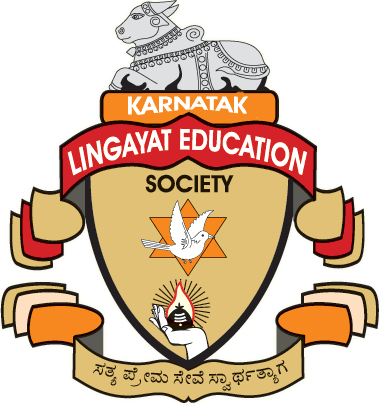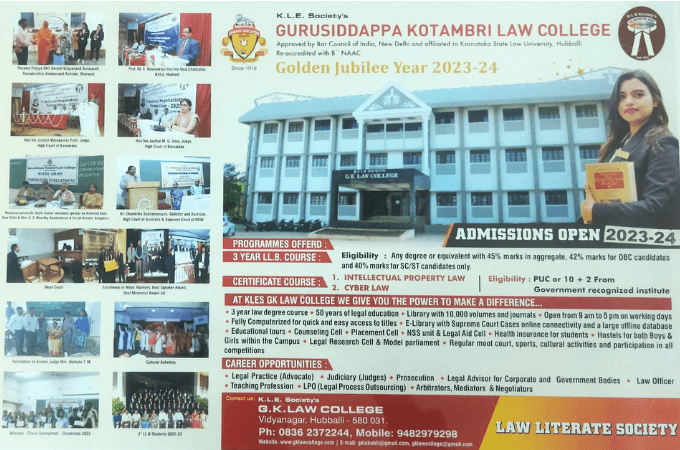Academics
“Success is the journey rather than destination”

K.L.E. Society’s Gurusiddappa Kotambri Law College, Hubballi
Academic Programme
College is offering Three Year – LL.B. Programme
The Syllabus Prescribed by Karnataka State Law University, Hubballi for 3 Year LL.B. Degree Programme:
| SEM | Course | Subject |
|---|---|---|
| I | I | Constitutional Law- I |
| II | Contract-I | |
| III | Law of Torts | |
| IV | Family Law-I: Hindu Law | |
| V | Criminal Law-I: Indian Penal Code | |
| VI | English (For Kannada Medium Students) |
| SEM | Course | Subject |
|---|---|---|
| II | I | Constitutional Law- II |
| II | Contract-II | |
| III | Labour Law-I | |
| IV | Property Law | |
| V | Family Law –II: Mohammedan Law & Indian Succession Act | |
| VI | Kannada /Kannada Kali ( For Non Kannada Students) |
| SEM | Course | Subject |
|---|---|---|
| III | I | Jurisprudence |
| II | Labour Law – II | |
| III | Law of Taxation | |
| IV | Criminal Law –II: Criminal Procedure Code, 1973, Juvenile Justice (Care and Protection of Children) Act, 2000 and Probation of Offenders Act, 1958. | |
| V | Administrative Law |
| SEM | Course | Subject |
|---|---|---|
| IV | I | Public International Law |
| II | Optional-I: Human Rights Law and Practice / Insurance Law | |
| III | Optional-II: Banking Law / Right to Information | |
| IV | Clinical Course-I: Professional Ethics And Professional Accounting System | |
| V | Clinical Course-II: Alternative Dispute Resolution Systems |
| SEM | Course | Subject |
|---|---|---|
| V | I | Company Law |
| II | Civil Procedure Code And Limitation Act | |
| III | Optional-III: Intellectual Property Rights-I / Penology & Victimology | |
| IV | Optional-IV: Interpretation of Statutes & Principles of Legislation / Competition Law | |
| V | Clinical Course-III: Drafting, Pleading and Conveyance |
| SEM | Course | Subject |
|---|---|---|
| VI | I | Law of Evidence |
| II | Environmental Law | |
| III | Optional – V: Intellectual Property Rights-II / White Collar Crimes (Privileged Class Deviance) | |
| IV | Optional – VI: Land Law / Law Relating to International Trade Economics | |
| V | Clinical Course-IV: Moot Court Exercise and Internship |
Programme Outcomes and Programme Specific Outcomes
Programme Outcomes
The law students at the time of graduation will be able to acquire the following capabilities.
- Problem analysis: Identify, formulate, research literature, and analyze complex legal problems reaching substantiated conclusions using the legal principles and appropriate law Use research-based knowledge and research methods including design of experiments, analysis and interpretation of data, and synthesis of the information to provide valid conclusions.
- Ethics: Apply ethical principles and commit to professional ethics and responsibilities and norms of the legal practice
- Critical Thinking: Take informed actions after identifying the problems, checking out the degree to which these problems are serious, and looking at our ideas and decisions from different perspectives.
- Communication/ Mooting/ Drafting Skills: Speak, read, write, listen argue and present clearly in person and through electronic media in English and in one Indian language to convince the concerned.
- Social Interaction: Elicit views of others, mediate disagreements and help to reach conclusions in group settings.
Programme Specific Outcomes:
- Understand the basic concepts of Jurisprudence and philosophy of Constitution.
- Analyze the relationships among Bar and Bench,
- Understand analytical and research skills to build their career.
- Expose to a variety of disciplinary approaches to legal study and on the complexity of legal practice.
- Understand the application of laws in the society and to incorporate social justice lawyering into their practice.
Course Outcomes
- Understanding of substantive and procedural law: Students will be able to explain and apply basic concepts, theories, procedures and rules of law.
- Legal analysis and reasoning including legal research, problem solving, written and oral communication in a legal context:.
- Students will be able to create efficient and productive research strategies .
- Able to draft basic legal and other documents that are organized, responsive to the legal issue presented.
- Enhance the ability to communicate in a professional manner.
- Exercise of proper professional and ethical responsibilities to clients and the legal system.
- Environment and sustainability; understand the impact of legal solutions in environmental and societal context.
Eligibility and Admission Procedure
Admission to first year of the 3 year LL.B. course is strictly based on merit, based on the marks secured by the candidate in the qualifying examination.
To be eligible for admission in the 3 year LL.B. course, the candidate should:
- Have graduated in any discipline of knowledge from a University established by an Act of Parliament or by a State Legislature or an equivalent national institution recognized as a Deemed to be University or Foreign University recognized as equivalent to the status of an Indian University by an authority competent to declare equivalence, may apply for Three Year degree course in law leading to the conferment of LL.B. degree on successful completion of the regular programme conducted under these Regulations.
- Be or be less than thirty years in case of general category of applicants and thirty-five years in the case of applicants from SC, ST, and other backward communities as on 1st June.
- Have secured marks, which shall not be below 45% (44.5% and above shall be treated as 45%) of total marks in case of general category applicants, 42% (41.5% and above shall be treated as 42%) for OBC category and 40% (39.5% and above shall be treated as 40%) of total marks in case of SC and ST applicants.

Intake and Reservation
The intake capacity is 120. While admitting candidates to the course, reservation policy of the Government of Karnataka governing admission to higher educational institutions issued from time to time shall be applied.
Fee structure
Candidate seeking admission to the three year LL. B. degree course and those admitted to such course shall pay the tuition and other fees as prescribed by the University/society from time to time.
Regulations Governing Three year LL.B. degree programme
The Vice Chancellor of the Karnataka State Law University , Hubli makes the following regulation under section 86 read with section 34 (2)(ii) and sec. 49 of the Karnataka State Law University Act, 2009.
- TITLE: These Regulations may be called as “The Karnataka State Law University’s Regulations Governing the Three Year LL.B. Degree course in Law”.
- EXTENT: These regulations extend to all University Law Colleges, Departments of studies in Law and all affiliated Law Colleges within the jurisdiction of the Karnataka State Law University which are accorded permission to start Three Year Degree Course in Law.
- COMMENCEMENT: These regulations shall come into force from the beginning of the academic year 2009-10.
- DEFINITIONS: In these Regulations, the expressions, “University”, “University Area”, “College”, “Affiliated College”, “Department”, “Department of Studies”, “Post Graduate Department”, “Post Graduate Department of Studies”, “Teachers”, and “Principal” bear the same meanings as assigned under Section 2 of the Karnataka State Law University Act, 2009.
- THE PROGRAMME & DURATION:
- (a) LL.B. Three Years Programme shall be of three years’ duration spread over six semesters.
- (b) Each Academic Year Shall be divided into two semesters.
- (c) Each Semester shall consist of 18 weeks. —
- d) The programme includes course wise (subject) internal marks, compulsory practical training (Moot court, Drafting Pleading and Conveyancing , ADR and professional ethics) and internship along with theory exams
- (e) The papers and the syllabus shall be as given in the Schedule appended to these regulations.
Instructions & Training
- (a) Instructions & training for the course shall be not less than 30 class hours per week including tutorials, moot room exercise and seminars provided there shall be at least 24 lecture hours per week.
- (b) There shall be for each paper four class hours of one-hour duration each and one hour of tutorial/ moot court/project work per week.
- (c) Each registered student shall have completed minimum of 12 weeks of internship during the entire period of legal studies under NGO, Trail and Appellate Advocates, Judiciary, Legal Regulatory authorities, Legislatures and Parliament, other Legal Functionaries, Market Institutions, Law Firms, Companies and Local self Government.
- (d) The internship in any year cannot be for a continuous period of more than four weeks and all students shall at least gone through once in entire academic period with Trail and Appellate Advocates.
- (e) Each student shall keep an internship diary in the form stipulated by the University and the same shall be evaluated by the Guide in Internship and also a Core Faculty member of the staff each time. The total marks shall be assessed in the Final Semester of the course in the 4th Clinical paper as stipulated under the Schedule appended to these Regulations.
Explanation:
A College or Department shall be deemed to be working whole time if the working time of the college or University Department extends to at least eight hours continuously on every working day comprising of classroom teaching of four periods, each period being one-hour duration and the remaining four hours devoted to clinical, curricular and co-curricular activities.
Eligibilty Criteria for Admission
- (a) An applicant who was graduated in any discipline of knowledge from a University established by an Act of Parliament or by a State Legislature or an equivalent National Institution recognized as a Deemed to be University or Foreign University recognized as Equivalent to the status of an Indian University by an authority competent to declare equivalence, may apply for Three Year degree course in law leading to the conferment of LL.B degree on successful completion of the regular programme conducted under these regulations.
- (b) Minimum percentage of marks in qualifying examination shall not be below 45%( 44.5% shall be treated as 45%) of total marks in case of general category applicants, 42% (41.5% and above shall be treated as 42%) for OBC category and 40%(39.5% and above shall be treated as 40%) of the total marks in case of SC and ST applicants.
- (c) Maximum age for seeking admission is limited to thirty years in case of general category of applicants and to thirty five years in case of applicants from SC, ST and other backward communities as on 1st June.
Admission Procedure
Admission to the course shall be made strictly on the basis of merit.
Provided that while making admission to the course reservation policy of the Government of Karnataka governing admission to higher Educational institutions issued from time to time shall be applied.
INTAKE:
- (a) No College or Department of studies in Law authorized to impart education in LL.B degree course shall admit more than 60 students in one division.
- (b) The University shall reserve the right to prescribe the number of divisions in each Law College or the Department of studies in Law.
TUTION AND OTHER FEES:
Candidates seeking admission to the LL.B degree course and those admitted to such course shall pay the tuition and other fees as prescribed by the University from time to time.
CURRICULAM:
- (a) Candidates admitted to the LL.B. course shall have to attend 6 semester courses spread over 3 years.
- (b) In each semester, the students shall have to study the courses prescribed by the University in these Regulations.
- (c) The course descriptions shall be, as set out from time to time in the schedule.
MEDIUM OF INSTRUCTION:
The medium of instruction in the LL.B degree course shall be in English. However the examinees shall have the option to answer the question papers in the examination either in English or in Kannada.
ATTENDANCE:
No student shall be permitted to appear for the end-of-semester examination in a given course unless he/she has, to the satisfaction of the course teacher, fulfilled the course requirements and has put in not less than 70% attendance in the course concerned.
Provided that a student who has attended not less than 65% of classes in each of the subjects prescribed may be permitted to keep the term for reasons to be recorded in writing and to the satisfaction of the Principal of the College or the Dean of the Faculty as the case may be.
PROMOTION:
- (a) Every student shall be promoted to the next higher class irrespective of the fact that he has failed in any of the papers prescribed for the study.
- (b) Students are required to successfully complete the entire course within six years from admission to the course.
AWARD OF THE DEGREE
A student shall be eligible for the award of the LL.B. (Bachelor of Laws) Degree after he/she has successfully completed all the prescribed courses in all the semesters and provided his or her character and conduct are found to be satisfactory during the course.
AWARD OF THE CLASSES:
The award of classes shall be as under:
- a) 70% and more First Class with Distinction
- b) 60% and above but less than 70% First Class
- c) 50% and above but less than 60% Second Class
- b) 40% and above but less than 50% Pass Class
The award of classes shall be as under:
- a) 70% and above O (Outstanding)
- b) Less than 70% to 65% A+ (Excellent)
- c) Less than 65% to 60% A (Very Good)
- d) Less than 60% to 55% B+ (Good)
- e) Less than 55% to 50% B (Above Average)
- f) Less than 50% to 45% C+ (Average)
- g) Less than 45% to 40% C (Pass)
- h) Less than 40% F (Fail)
REMOVAL OF DIFFICULTY:
If any difficulty arises in giving effect to the provisions of this regulation the Vice Chancellor may by order of notification do anything which appears to him necessary for the purpose of removing the difficulty.
Every such order so notified shall as soon as may be after its notification, be laid before the Academic Council and Syndicate for approval.
REPEAL AND SAVINGS CLAUSE:
- (a) Any Regulation existing herein before governing the 3 years LL.B course stand repealed.
- (b) Any action decision or direction has taken or directed by the University under any Rule or Regulation in force at any time earlier than this Regulation coming into force, shall be valid, binding on the institutions and remain in force notwithstanding anything contained in this Regulation.
Admission procedure for Certificate Course
College is offering Certificate Courses in the areas of Intellectual Property Rights and Cyber Laws having affiliation with Karnataka State Law University Hubballi. Any student with PUC or 10 + 2 or equivalent qualification can take admission and avail the benefits of the courses. Duration of the course is six months.
Code of Conduct for Students
Students are required to exhibit high standards of academic interest and responsible behavior, befitting postgraduate level of the students.
Following rules of discipline shall be strictly binding on all the students.
- Students have to keep the campus clean and green.
- Use dustbins.
- Chewing of Gutkha, Supari and Pan is prohibited.
- Drive slowly in the campus.
- Smoking is prohibited.
- Talk in a low tone.
- Do not blow horn in the campus.
- Protect public property.
- Mobile phones are strictly prohibited in the campus.
- Ragging of student is strictly prohibited.
Fees Structure
Fees as prescribed by Government and University from time to time.
Scholarships, Prizes & Concessions
- There are endowment scholarships which are awarded as per conditions laid down in that behalf. The Sirasangi Trust and L.E. Association Dharwad grant scholarships to the deserving Lingayat Students.
- The Government of Karnataka and Government of India will be awarding free studentship concessions and scholarship to SC, ST students. All the SC/ST students are strictly advised to apply for the same within the prescribed date which will be notified on the college notice board.
- In addition, the State Government awards fee concessions to the students whose family income is not more than Rs.1,00,000=00 per annum irrespective of the community or the caste to which they belong (other than SC/ST). All such students are strictly advised to apply for the same within the prescribed date along with the income certificate issued by respective Tahasildars.

- A student securing highest marks in Labour Law Paper III semester of II year LL.B is eligible for Cash Prize of Late P. G. Wadekar.
- Dr. M. B. Jadhav Award for those who secure highest Marks in Constitutional Law.
- Dr. M. B. Jadhav Award for those who secure highest Marks in Administrative Law.
- Miss. Shilpa G. Patil memorial award for those who secure highest marks in I LL.B.



